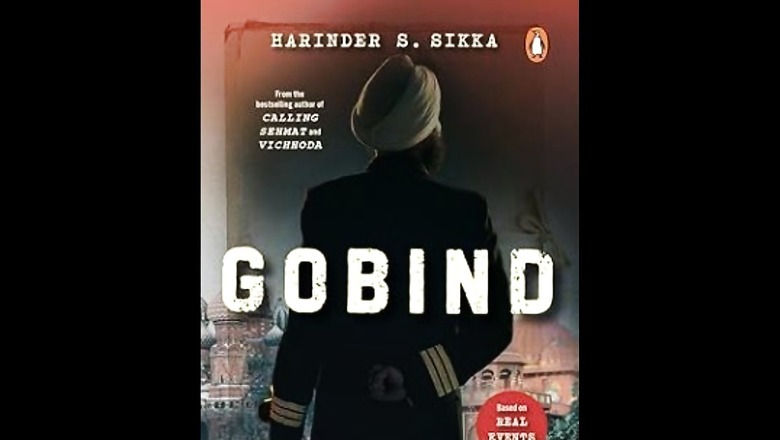
views
Harinder S Sikka’s Gobind is an enthralling narrative that interweaves themes of valour, love, and human resilience, set against the backdrop of a young man’s journey from impoverishment to heroism. The novel draws readers into the life of its protagonist, Gobind, with a gripping blend of emotional depth and action-packed sequences.
The protagonist, Gobind, is born into an impoverished Sikh family in the hinterlands of Bihar. His story begins in a dire neighbourhood, where his father, Ranjit Singh, works tirelessly to uplift his family. Despite these efforts, Gobind’s early life is marked by hardship, compelling him to work from a young age. His transformation begins with an epiphany, as he realises the sacrifices made by his family for his sake. This moment of truth propels him to excel in his studies, scoring perfect marks in his school exams and setting his sights on a career in the Indian Navy.
Sikka’s narrative prowess is evident in his portrayal of Gobind’s journey through the National Defence Academy. The detailed recounting of life within the academy is imbued with authenticity, undoubtedly drawn from Sikka’s own experiences as a former naval officer. Gobind’s unwavering determination and resilience shine through as he navigates the challenges of military training, eventually emerging as a distinguished naval cadet.
However, Gobind is not merely a tale of professional success. It is deeply rooted in the emotional landscapes of its characters. The novel delves into Gobind’s poignant love story with Meera, the daughter of a village landlord, Bihari Lal. Their love, which begins with enchanting euphoria, faces a tragic turn, embodying the words of the mystic poet Meerabai: ‘this separation is a bridge for our togetherness.’ The profound impact of this relationship shapes Gobind’s character, infusing his journey with a sense of yearning and loss.
Novelist Harinder Sikka masterfully juxtaposes Gobind’s personal struggles with broader social themes. The novel addresses the entrenched casteism and socio-economic disparities that define Gobind’s early life. His rise from these belittling circumstances serves as an inspiring bildungsroman, highlighting his unwavering commitment to his principles. Despite the adversities, Gobind’s trajectory is marked by grit, determination, and an unyielding resolve to uplift his family and himself.
As Gobind’s naval career progresses, he faces new challenges and ethical dilemmas. His assignment to a frontline warship frigate in Mumbai and subsequent deployment to Leningrad for a submarine operation introduce a complex web of deceit, politics, and espionage. The story intensifies as Gobind uncovers the faulty state of the submarine Sindhkosh, a fact that Russian officials attempt to conceal. His confrontation with this perilous situation underscores his integrity and courage, further solidifying his heroic persona.
In Leningrad, Gobind encounters Taraa, a woman who bears a startling resemblance to his lost love, Meera. Their relationship, marked by an immediate connection, adds a layer of romantic intrigue to the story. However, Sikka’s treatment of this romance feels somewhat rushed, leaving readers yearning for a deeper exploration of their bond. Despite this, Taraa’s presence injects renewed purpose into Gobind’s life, mirroring the spiritual guidance of his mother, Amrita, and reinforcing the novel’s themes of love and resilience.
Sikka’s art of storytelling is enriched by the supporting characters, each contributing to Gobind’s journey in meaningful ways. The kind-hearted superintendent in the Navy, Muthuswamy’s humorous antics, and Bihari Lal’s late realizations about his daughter’s simple wishes all add depth to the story. These characters embody the inalienable humanity that the novel upholds, offering glimpses into the subtle yet profound impacts of their actions.
Gobind also explores the philosophical underpinnings of heroism, drawing parallels with Nietzsche’s theory of eternal return. Gobind’s cyclical encounters and the recurring themes of love and sacrifice evoke a sense of timelessness, emphasizing the universal nature of his struggles and triumphs. The novel’s reflection on the principles of heroism resonates with the definitions offered by figures like Christopher Reeve, Joseph Campbell, and Tom Hanks, underscoring the extraordinary within the ordinary.
The narrative’s pace is brisk, with Sikka maintaining a delicate balance between action and introspection. His prose is sprinkled with words of wisdom, providing readers with moments of reflection amidst the unfolding drama. However, some editing errors and redundancies slightly mar the reading experience, though they do not detract significantly from the overall impact of the story.
Based on real events, Gobind is a simple tale told with sincerity and passion. While it may not reach the same heights as Sikka’s previous work, Calling Sehmat, it stands on its own as a compelling story of heroism and love. The novel’s cinematic quality, evident in its vivid descriptions and dynamic plot, hints at the potential for adaptation, much like its predecessor.
The novel, Gobind is a wonderful read that celebrates the enduring spirit of its protagonist. Through Gobind’s journey, Sikka invites readers to reflect on the values of loyalty, perseverance, and human empathy. The novel’s large ground of emotions, combined with its thrilling narrative, ensures that it leaves a lasting impression, making it a worthy addition to contemporary Indian writing in english.
Harinder S. Sikka’s book ‘Gobind’ is published by Ebury Press (an imprint of Penguin Random House)
Ashutosh Kumar Thakur is a Bengaluru-based management professional, curator, and literary critic. Views expressed in the above piece are personal and solely that of the author. They do not necessarily reflect News18’s views.

















Comments
0 comment